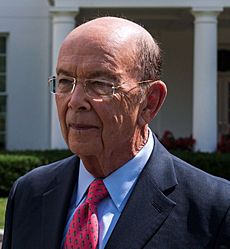Wilbur Ross facts for kids
Quick facts for kids
Wilbur Ross
|
|
|---|---|
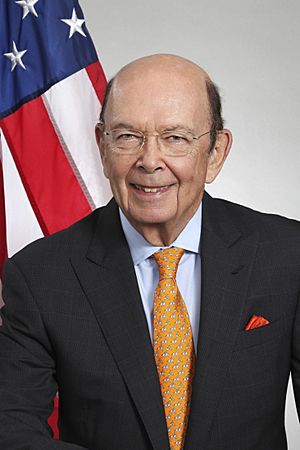
Official portrait, 2017
|
|
| 39th United States Secretary of Commerce | |
| In office February 28, 2017 – January 20, 2021 |
|
| President | Donald Trump |
| Deputy | Karen Dunn Kelley |
| Preceded by | Penny Pritzker |
| Succeeded by | Gina Raimondo |
| Personal details | |
| Born | November 28, 1937 Weehawken, New Jersey, U.S. |
| Political party | Republican (2016–present) |
| Other political affiliations |
Democratic (before 2016) |
| Spouses |
Judith Nodine
(m. 1961; div. 1995)Betsy McCaughey
(m. 1995; div. 2000)Hilary Geary
(m. 2004) |
| Children | 2 |
| Education | Yale University (BA) Harvard University (MBA) |
Wilbur Louis Ross Jr. (born November 28, 1937) is an American businessman. He served as the 39th United States Secretary of Commerce from 2017 to 2021. He is a member of the Republican Party. Before his government role, Ross was the chairman and CEO of WL Ross & Co from 2000 to 2017.
Ross was known for helping companies that were struggling financially. He would buy and reorganize businesses in industries like steel, coal, and textiles. After making them better, he would sell them for a profit. This earned him the nickname "King of Bankruptcy." Ross has led or been a main director for over 100 companies in more than 20 countries. In 2017, at age 79, he became the Secretary of Commerce under President Donald Trump. He was the oldest person to join the U.S. Cabinet for the first time.
Contents
- Early Life and Education
- Business Career Highlights
- Secretary of Commerce (2017–2021)
- After Government Service (2021–present)
- Awards and Recognition
- Organizations and Memberships
- Political Views
- Personal Life
- See also
Early Life and Education
Wilbur Ross was born on November 28, 1937, in Weehawken, New Jersey. He grew up in nearby North Bergen, New Jersey. His father was a lawyer who later became a judge. His mother taught third grade for 40 years.
Ross went to Xavier High School, a Catholic school in Manhattan. He graduated in 1955. In 1959, he earned a bachelor's degree from Yale College, which was also his father's college. At Yale, he worked at the radio station and edited a literary magazine. He first dreamed of being a writer. In 1961, he received a master's degree in business from Harvard Business School.
Business Career Highlights
Starting Out in Business
In 1963, Ross joined a company that later became Wood, Struthers & Winthrop. There, he helped sell off the investments of its venture capital part.
He then worked for Faulkner, Dawkins & Sullivan. This company focused on securities research. Ross became the president of its investment banking operations.
Working at Rothschild & Co
In 1976, Ross started working at the New York City office of Rothschild & Co. He stayed there for 24 years. He led the team that advised companies going through bankruptcy. By 1998, Ross had worked on many of the largest bankruptcies. These included Drexel Burnham Lambert and Texaco.
In the 1980s, Donald Trump's casinos in Atlantic City faced financial trouble. Ross, working for Rothschild & Co, helped investors in the casinos. He helped arrange a deal that allowed Trump to keep control of his casinos.
Founding WL Ross & Co
In April 2000, Ross started his own company, WL Ross & Co. He raised $450 million to buy a fund from Rothschild and make new investments. By 2003, his fund had a very good average return.
In 2006, Ross sold WL Ross & Co to Amvescap, which is now called Invesco.
International Steel Group (ISG)
In 2002, WL Ross & Co created International Steel Group. Ross bought the assets of a bankrupt company called Ling-Temco-Vought. He paid a very low price for them. Later, the U.S. government added a tax on imported steel.
A year later, WL Ross & Co bought the assets of another bankrupt company, Bethlehem Steel. These deals helped save some jobs. Ross worked with the United Steelworkers union.
In 2005, WL Ross & Co sold International Steel Group to Mittal Steel Company for $4.5 billion. This sale made a huge profit for Ross and his company. Ross personally made a large profit and joined the board of Mittal Steel.
International Textile Group (ITG)
WL Ross & Co bought Burlington Industries in 2004. They combined it with Cone Mills to create International Textile Group. Ross outbid Warren Buffett for Burlington Industries.
In 2016, International Textile Group was bought by another investment firm.
International Automotive Components Group (IAC)
International Automotive Components Group was started in 2006 by WL Ross & Co. This company bought parts of other automotive businesses. They acquired operations from Lear Corporation and divisions of Collins & Aikman.
International Coal Group (ICG)
WL Ross & Co founded International Coal Group in 2004. They bought assets from several coal companies that were in financial trouble. The United Mine Workers of America protested some changes to health care and pensions for workers.
In 2006, there was a tragic explosion at the Sago Mine disaster. This mine was indirectly owned by International Coal Group. Twelve miners died in the accident. The mine had received many safety violation warnings before the explosion.
In 2011, Arch Coal bought International Coal Group for $3.4 billion.
By 2016, WL Ross & Co was a major investor in Navigator Gas. This company ships liquefied gas.
Net Worth and Financial Matters
In 2017, Forbes magazine reported that Ross had a net worth of $2.5 billion. However, after he was nominated as Commerce Secretary, his financial forms showed less than $700 million in assets. Forbes later changed his estimated net worth to $600 million.
In 2016, Ross agreed to pay back investors $11.8 million. He also paid a fine of $2.3 million. This was to settle an investigation by the U.S. Securities and Exchange Commission. The investigation was about fees charged by WL Ross & Co. The company had reported the issue themselves.
Secretary of Commerce (2017–2021)
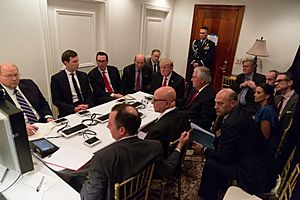
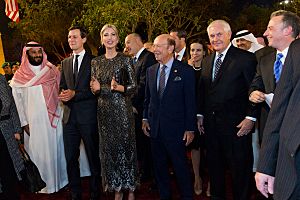
Becoming Commerce Secretary
On November 30, 2016, President-elect Donald Trump announced he would nominate Ross for Secretary of Commerce. The Senate approved Ross on February 27, 2017, with a vote of 72–27. Ross officially took office on February 28, 2017.
Ross was 79 years old when he became Secretary. This made him the oldest person to be appointed to the U.S. Cabinet for the first time.
Trade Discussions
UK Trade After Brexit
In December 2016, Ross said that Brexit (the UK leaving the European Union) was a "God-given opportunity." He believed it could help other countries like Ireland and Germany attract business away from the United Kingdom's financial industry. In 2017, Ross stated that a trade deal with the UK was not a top priority for the Trump administration.
Tariffs and Trade Policies
In September 2017, Ross visited Beijing to help calm the U.S.–China trade disagreements. In February 2018, the Commerce Department suggested increasing taxes (tariffs) on imported aluminum and steel. On March 1, 2018, President Trump put a 25% tariff on steel and a 10% tariff on aluminum imports. Ross said these tariffs were meant to "change China's behavior."
In 2018, the U.S. also put tariffs on steel and aluminum from the European Union, Canada, and Mexico. Ross said these tariffs were small issues and that the EU would "get over this." He also suggested that the Trump administration might put tariffs on cars imported from the EU.
Ban of Huawei
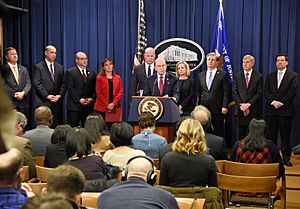
In January 2019, Ross was present when 23 charges were announced against Huawei, a Chinese technology company, and its CFO Meng Wanzhou. These charges included financial fraud and violating sanctions. In July 2019, Ross said the U.S. would keep Huawei on a special list but allow some licensed sales.
Public Comments and Shutdown
In May 2017, Ross visited Saudi Arabia with President Trump. He commented that there were no protests, not realizing that public protests were banned there.
During the 2018–19 federal government shutdown, Ross received some criticism. He seemed surprised that unpaid government workers might need to visit food banks instead of getting personal loans.
Financial Disclosures and Rules
In February 2019, Ross's financial disclosure was not accepted by the United States Office of Government Ethics. He had reported selling bank stock, but he still owned some.
Ross had to follow rules about selling his financial holdings to avoid conflicts of interest. In 2018, it was reported that Ross still had investments in companies connected to the Chinese government and a shipping firm. He had stated in 2017 that he had sold all his financial holdings. Ross later said he "mistakenly believed" all his stock was sold. In July 2018, he announced he would sell all his remaining stock.
In October 2018, documents showed Ross attended a meeting with Chevron Corporation executives. They discussed oil and gas, taxes, and trade. At that time, Ross's wife owned shares in Chevron.
2020 Census Citizenship Question
As Secretary of Commerce, Ross oversaw the Census Bureau and the 2020 Census. In December 2017, he approved adding a question about U.S. citizenship status to the Census. This question had not been on the Census since the 1940s.
Many states and cities filed a lawsuit to stop the question. A U.S. federal judge, Jesse M. Furman, ruled against adding the question in January 2019. The judge said Ross had violated federal rules. The Supreme Court later upheld the decision to block the citizenship question from the 2020 Census.
Department of Commerce Operations
In July 2019, Politico reported that the Commerce Department under Ross was facing challenges. Some staff felt that Ross was not fully engaged. Morale was described as "very low."
NOAA and Hurricane Dorian
On September 1, 2019, President Donald Trump incorrectly stated that Hurricane Dorian was a major threat to Alabama. The Birmingham, Alabama, branch of the National Weather Service (NWS), which is part of the Commerce Department, quickly corrected this.
Reports later said that Ross had been asked to "fix the problem" regarding the NWS statement. This led to a statement from NOAA (which oversees NWS) that seemed to support Trump's earlier incorrect claim. This caused concern among scientists. A report by the National Academy of Public Administration found that NOAA's leadership violated its scientific integrity policy.
In January 2020, Ross was asked if the COVID-19 outbreak in China would harm the U.S. economy. Ross said it might "help to accelerate the return of jobs to North America." He added that it gave businesses "another thing to consider" about their supply chains. The outbreak later became a global pandemic and caused a major economic downturn in the U.S.
2020 Census Count Deadline
Due to the COVID-19 pandemic, the deadline for the 2020 United States Census was first extended to October 31, 2020. However, on August 3, 2020, the Census Bureau announced they would move the deadline up to September 30, 2020. Many groups worried this shorter time would lead to an inaccurate count, especially for minority groups and young adults.
A federal judge, Lucy Koh, blocked the plan to end counting early. She said the Commerce Department did not give a good reason. The count eventually ended on October 15, 2020, after the administration appealed to the Supreme Court.
After Government Service (2021–present)
On July 23, 2021, the Chinese government placed sanctions on Ross. This was in response to U.S. sanctions on Hong Kong officials.
Awards and Recognition
- In 1999, Ross received the Order of Industrial Service Merit medal from South Korean president Kim Dae Jung. This was for his help during the 1997 Asian financial crisis.
- In 2014, he was given the American Irish Historical Society Gold Medal. This recognized his work in Ireland and for Irish-American causes.
- The Japanese government awarded Ross the Order of the Rising Sun, Gold and Silver Star. This was for his work as Chairman of the Board of New York's Japan Society. It also recognized his efforts to help the Japanese economy and his relief work after the 2011 Tōhoku earthquake and tsunami.
Organizations and Memberships
Ross has been a director of the Turnaround Management Association. He is also in its hall of fame. He was the vice-chairman of the board of Bank of Cyprus, a large bank in Cyprus. Ross has also served on the board of trustees for the Brookings Institution. He is on the board of advisors for Yale School of Management. He was also a board member of the Yale University Art Gallery. Ross has been on the board of directors of Navigator Gas since March 2012.
Political Views
Party Affiliation Change
Wilbur Ross was an early supporter of Donald Trump's presidential campaign. However, he was previously a registered Democrat. He served as an officer for the New York State Democratic Committee. He also hosted fundraisers for Democratic candidates. He worked under President Bill Clinton on the board of the U.S. Russia Investment Fund.
Since at least 2011, Ross has donated money to Republican candidates and groups. He officially became a registered Republican in November 2016.
Privatization Ideas
In the 1990s, New York City mayor Rudy Giuliani appointed Ross as his advisor on privatization. Ross helped push for selling off city-owned assets to private companies. This included public broadcasting stations and empty land lots.
Trade Policy Views
Ross has described his trade views as "pro-sensible trade." He believes the U.S. should allow access to its markets for countries that "play fair." He thinks countries that do not play fair should face consequences.
In 2004, The Economist described Ross as someone who supported protectionism. At the 2018 World Economic Forum, Ross said that "There have always been trade wars." He added that now, "U.S. troops are now coming to the ramparts."
Personal Life
Wilbur Ross has been married three times. He first married Judith Nodine in 1961, and they divorced in 1995. They have two daughters, Jessica Colby Ross and Amanda Colby Ross. Amanda later started a baking company. In 1995, Ross married Lieutenant Governor of New York Betsy McCaughey. They divorced in 2000. On October 9, 2004, Ross married his third wife, Hilary Geary Ross, who is a society writer.
Ross owns several properties. In 2016, he bought a large house in Washington, D.C.. In 2018, he purchased a house in The Berkshires. He also owns two properties in Palm Beach, Florida.
Ross has an art collection worth a lot of money. It includes works by Western surrealists and contemporary Eastern sculptures. He owns 25 works by René Magritte, including some of the artist's most valuable paintings.
Helping Others (Philanthropy)
Ross donated $10 million to help build the new campus for Yale School of Management.
See also
 In Spanish: Wilbur Ross para niños
In Spanish: Wilbur Ross para niños
- List of people and organisations named in the Paradise Papers
 | Charles R. Drew |
 | Benjamin Banneker |
 | Jane C. Wright |
 | Roger Arliner Young |


